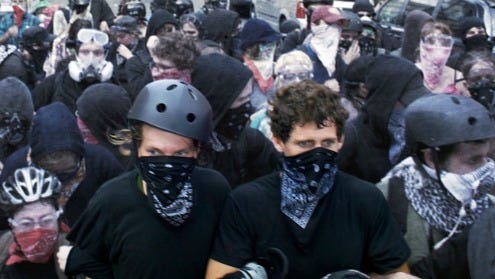Better This World

For info and showtimes, click here.
This often-insightful, though occasionally troubling, documentary looks at the case of David McKay and Bradley Crowder, two guys in their early 20s from Midland, Texas, who were arrested during the 2008 Republican National Convention in Minneapolis for planning to firebomb the police and/or delegates. They'd already made some Molotov cocktails, but the authorities arrested them before they hurt anyone.
The documentary, which is not overtly partisan but clearly takes the side of McKay and Crowder, argues that they were know-nothing nobodies who hated the war in Iraq but didn't know how to act upon their impulses until they met one Brandon Darby. Darby, a slightly older and infinitely more worldly activist than the two Texas men, was a charismatic figure who enlisted them to come to Minnesota to try to shut down the convention.
Darby was also, it turns out, an informant for the FBI.
"Better This World," directed by Kelly Duane and Katie Galloway in association with the Investigative Reporting Program at UC Berkeley, takes the position that Darby entrapped McKay and Crowder by pushing them toward a more violent expression of their political beliefs than they would have arrived at if left to their own devices. It's a pretty convincing case, too, although providing the opportunity for wrongdoing is not the same as making the choice for those who cross the line.
It's the old dilemma when it comes to crimes, particularly anti-terrorism cases — which are generally handled as legal rather than military affairs — that end with an arrest before an overt act of violence has been committed. Law-enforcement officials have a duty to stop a crime before it happens when possible, but that invariably makes proving their case harder.
Would McKay and Crowder have carried out their plans to firebomb the RNC? Maybe, maybe not and maybe they would've just torched some cars instead of some cops. We'll never know. The two men, speaking earnestly to the camera with open expressions and all-American good looks, make for highly sympathetic subjects.
The film employs extensive interviews with Crowder and McKay, including several intimate conversations between them and their loved ones that I suspect were either staged for the cameras or reenacted for the filmmakers' benefit. One scene in particular between McKay and his girlfriend, which was clearly shot using two cameras, seems exceedingly unlikely to have been captured by serendipity. Either that, or the pair — knowing their conversation was being filmed — purposefully poured out their emotions for the occasion.
If this is true, then the filmmakers are guilty of the exact same tactics of which they accuse the government: Not merely sitting back and waiting for events to unfold, but actively — if obliquely — guiding them.
Still, "Better This World" raises difficult questions about the nature of law enforcement methods and how the justice system's reach has grown longer in the wake of fears about terrorism.
3.5 Yaps



